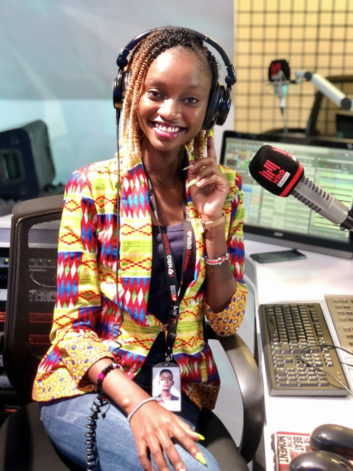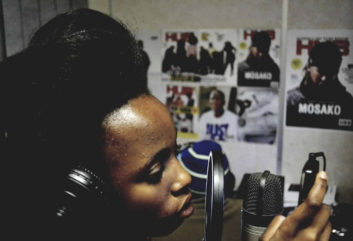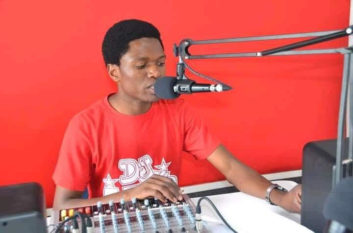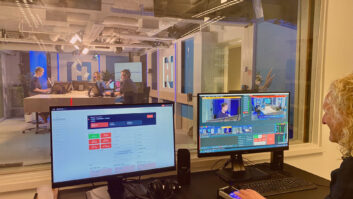
Radio is Africa’s most accessible, influential and used information outlet, according to a recent survey by United Nations Education Scientific and Cultural Organization. Several radio stations in Africa have more than a million listeners each. An even more interesting phenomenon that is becoming a part of editorial policy for many radio stations is to engage young people as presenters, content creators and other important aspects of programming.
Radio is a wonderful way to interact, learn and communicate. There is a need to keep radio vibrant and active. Most importantly, it is important to engage young producers, presenters and reporters.
As the world celebrates International Youth Day, Aug. 12, with calls for youth engagement for global action, it is important to look at some of the young Africans who have taken radio industry by a storm.
[Read: How Africa’s Vernacular Radio Stations Are Helping Right Now]
Natalie Githinji is a presenter at NRG Radio, a youth-targeted station in Kenya. At only 23, Natalie, who is also an actress and content creator, hosts one of the most popular breakfast shows in Kenya — “NRG Breakfast Club.” It has a large audience among the youth.
“Young people love listening to the show because they see me as one of their own and they are able to express themselves on touchy subjects which affect them, while feeling protected” Natalie said
“I always share my stories on air, and many of them are able to relate, get inspired and open up,” she added.
According to Natalie, radio stations in Africa need to engage more youth to give them a platform to showcase their talent and connect with young people who really need representatives and people they can relate with at stations.
Also, she believes that young people need more coaching and mentorship, and opportunities to understand, learn about radio and digital management to be prepared and become better presenters. Most important, Natalie is encouraging radio stations to appreciate and drive the content that youth relate to.
Importance
In Botswana, Yandile Nuku is proving that the airwaves are just as important now, as ever. The young radio host uses the platform to improve access to business opportunities.

Through her weekly show, “Venture In” that airs on Duma FM in Botswana, Yandile helps young people to make sense and have better understanding of the business world. Yandile who has immense confidence in young Africans has managed to connect students to markets and different industries.
“Young people, are unchartered territory yet to be explored, diamonds in the rough yet to be discovered, the deal breakers yet to be processed and products yet to be sold,” she said.
Sub-Saharan Africa’s population is becoming more youthful — youth as a proportion of the total is estimated to be above 75%. With almost 200 million people aged between 15 and 24, Africa has the youngest population in the world. And it keeps growing rapidly. To realize a demographic dividend, there is need to invest and tap into the potential, creativity and energy of young people.
It is encouraging to see young people joining radio and demonstrating their talents.
Josephine Namakau Pumulo is the co-founder and communication lead at Agents of Change Foundation in Zambia. She uses radio to connect with and impact communities.
“As a child, I always wanted to be a journalist to share about many issues in the society, and to speak for the marginalized,” she shared.
Agents of Change uses radio as a tool to communicate issues that are relevant to young people. Currently, the organization is producing radio shows on different topics including climate change, eye health and reproductive health and rights.
Also, Pumulo is developing production guides for the agency’s young reporters and preparing them for the shows.
“We want our young people to appreciate that being on radio means a certain level of responsibility,” Pumulo said. “That is why we ensure that the content relayed to the public is verified and well researched.”
Joseph Mulekwa is one of the beneficiary of Agents of Change program. Joseph became a reporter and presenter at age 15. He was trained together with other 40 young people across Zambia in radio production and broadcasting.

Now, Joseph runs the “Voice Radio Show” on Pan African Radio 96.1 FM. Young people appreciate his show because of the impact. The show has given listeners an opportunity to hold leaders accountable.
“I feel so good to be a young radio presenter and it has given me an opportunity to engage with civic leaders, policy makers and local authority … and it has helped me to act as a gatekeeper between my community and our leaders,” he said.
All his shows are live and call-in programs. This he says allows him to engage with listeners and get feedback on how best to deliver the show and discuss issues.
Questions
In the show young people do the program together with the presenter. The show is a conversation where young people raise questions, give their opinions, suggestions and demand solutions. Their conversation is always about concerns and possible solutions to issues that they care about.
“Things are changing and the world is changing too. Young people are vibrant and have more creative ideas on how to engage with other fellow young people. More radio stations should engage more young people because we understand things that affect us in our community because we are the ones on the ground,” he added.
According to Mulekwa, mentorship and support to young presenters is critical for success. He is urging more organizations to trust and support radio broadcasting for, with and by young people.
“For example here in Zambia, we only have two organizations that cater to about 70% of young people in the country … If we had more organizations that are youth-driven and speak to youth broadcast, we can have more young people becoming radio presenters,” he said.
James Smart, a renowned journalist in Africa and former Reagan-Fascell Democracy Fellow at the National Endowment for Democracy, agrees on the important need for support to young people to enable them to join radio industry.
Most importantly, he advises young people interested in radio, to build their craft, learn how to present, engage audiences and connect. He urges young people not to be afraid and to try new things, create a broadcast identity.
“Create your own style and identity, copying other sounds and style is OK but please bring your personality to the job. We are suffering with radio voices because people went in and became a clone of someone they admired. Let’s inject some freshness into the business,” he said.
It’s safe to say that more young people, not less will be the new normal in the changing radio landscape — radio for youth, radio with youth and radio by youth.
Raphael Obonyo is a public policy analyst. He has served as a consultant with the United Nations and the World Bank. Also, he’s a writer and widely published in Africa and beyond. An alumnus of Duke University, he has authored and co-authored numerous books, including “Conversations about the Youth in Kenya.” Obonyo is a TEDx fellow and has won various awards.










